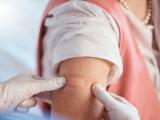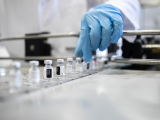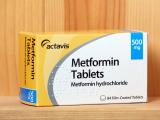In 100 days, President Joe Biden has made good on his promise of delivering 100 million COVID-19 vaccines in arms. In fact, the United States has administered 237 million vaccines in 100 days, and 100 million Americans have now received all vaccine doses.
"That's a hundred million Americans with a sense of relief and peace of mind, knowing that after a long and hard year, they're protected from the virus," said Jeff Zients, the White House COVID-19 coordinator. Zients clarified that not all 100 million Americans are considered fully protected—or 14 days out from their last shot.
He said roughly 40% of Americans are now protected against the worst pandemic the United States has seen since the 1918 influenza pandemic.
"A hundred million Americans who can follow the new CDC [Centers for Disease Control and Prevention] guidance released this week and enjoy going to the park with their family, dining and socializing with their friends outside, and many more outdoor activities without needing to wear a mask," Zients said.
The federal government has distributed more than 300 million vaccine doses, and Zients said enough vaccine has been procured to inoculate every American over the age of 16 within the next 31 days.
Moderna CEO suggests 3 vaccine doses needed
CDC Director Rochelle Walensky, MD, MPH, said the 7-day average of new COVID-19 cases continued to drop to 52,500 cases per day, about 16% fewer cases than reported in the previous week.
The United States reported 58,528 new COVID-19 cases yesterday, and 879 deaths, according to the New York Times. In total, the country has confirmed 32,315,363 COVID-19 cases, including 575,551 deaths.
On average, approximately 2.5 million to 3 million Americans are getting vaccinated each day, most with mRNA vaccines, which now require two doses. By the end of the year, however, two doses could become three.
Moderna CEO Stephen Hoge said yesterday during an event hosted on the social media platform Clubhouse that he anticipates a booster dose of the company's mRNA vaccine will need to be given 9 to 12 months after the second dose of the vaccine.
"Co-administration with an influenza vaccine would be the ideal way to do it," Hoge said. "One of the things we're going to look hard at over the summer this year, is how do we create data so that the CDC can provide that recommendation to healthcare systems so that it can be done as a single visit."
State Department says no travel to India
Late this afternoon, the White House announced it has directed the State Department to restrict travelers from India beginning May 4, based on advice from the CDC. Cases in India have been skyrocketing (see related CIDRAP News story).
Earlier today, during the press conference, Zients said the White House was not restricting travel and instead was making sure those who arrived from India followed strict quarantine and testing protocols.
However, Jen Psaki, the White House press secretary, said, "The policy [to restrict travel] will be implemented in light of extraordinarily high COVID-19 caseloads and multiple variants circulating in India."
J&J vaccine outcomes
Also today, both JAMA and Morbidity and Mortality Weekly Report (MMWR) published new data concerning adverse outcomes related to administration of the Johnson & Johnson (J&J, or Janssen) one-dose COVID-19 vaccine.
In JAMA, clinicians describe a case series of cerebral venous sinus thrombosis (CVST) in 12 patients following administration of the J&J vaccine. The cases caused the Food and Drug Administration (FDA) and the CDC to pause distribution of J&J for 10 days in April.
Of the 12 cases, three were fatal, three required admission into intensive care units (ICU), two were hospitalized, and four were discharged to home. All but one patient presented with severe headache.
Other patients described difficulty with speech, lethargy, and back and abdominal pain. Seven of the 12 patients had a risk factor for CVST— 6 were obese, and 1 used oral contraceptives.
In MMWR, authors report a total of 17 thrombotic events with low platelets following J&J vaccination, three of which were non-CVST. Overall, 97% of the adverse events reported among the 8 million doses distributed in the United States were non-serious.
Eighty-eight deaths were recorded after receipt of the J&J vaccine, but only three— all CVST — were connected to the medicine.
"The safety profile thus far of the Janssen COVID-19 vaccine is similar to that observed in clinical trials," the authors concluded.
"A rare but serious adverse event occurring primarily in women, blood clots in large vessels accompanied by a low platelet count, was rapidly detected by the U.S. vaccine safety monitoring system. Monitoring for common and rare adverse events after receipt of all COVID-19 vaccines, including the Janssen COVID-19 vaccine, is continuing."
In a related MMWR study, experts describe 64 anxiety-related adverse events at five mass vaccination sites distributing J&J vaccine. The events, which included 17 cases of syncope or fainting, all occurred before reports of CVST.
None of the anxiety-related events were considered serious, but the events were more common than those detected by the Vaccine Adverse Event Reporting System (VAERS) after seasonal influenza vaccination.
The reporting rates of syncope to VAERS after Janssen COVID-19 and influenza vaccines (2019-20) were 8.2 and 0.05 per 100,000 doses, respectively, the authors said.
Other US developments
- Disneyland opens today for the first time in 412 days, USA Today reported. Capacity at the theme park will be limited to 25%.
- Chicago is allowing businesses to expand capacity limits and making plans for summer festivals in its next phase of reopening, WBEZ The city saw its COVID-19 positivity rate drop below 5% this week.
- AstraZeneca executives have struggled to pull together the full data necessary to apply for FDA emergency use authorization (EUA) of its COVID-19 vaccine, the Wall Street Journal reports. The company had anticipated filing for an EUA in mid-April, but now says it may not be until mid-May.





















